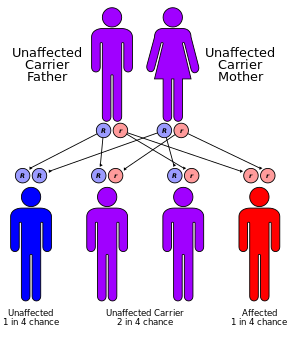CF may also impact the. The term Cystic fibrosis was given as the thick mucus built up inside respiratory tract that cause severe lung damage-cysts formation and fibrosis.
Cystic Fibrosis About The Illness The Butterfly Trust
People have cystic fibrosis CF because they have inherited a faulty gene from both of their parents.

What causes cystic fibrosis. Cystic fibrosis CF is a genetic disorder that causes problems with breathing and digestion. A mutation in the CFTR gene which controls the distribution of salt and fluids in and out of cells directly leads to CF. The cause of cystic fibrosis is genetics because a person needs to inherit a copy of a defective gene from both parents to develop the condition.
What Causes Cystic Fibrosis. Cystic fibrosis is an inherited disease caused by a mutation of a gene called Cystic fibrosis transmembrane conductance regulator gene CFTR gene. Cystic fibrosis genetics - what causes CF.
Not only lungs and pancreas people with CF may also face male infertility as the thick mucus causes the blockage of the Vas deferens or epididymis preventing release of sperm from testis. Cystic fibrosis is caused by mutations in the gene that produces the cystic fibrosis transmembrane conductance regulator CFTR protein. A person with cystic fibrosis has received an abnormal gene from each of their parents.
A baby who only inherits one mutated copy will be a carrier meaning they could have CF without displaying symptoms. A baby with CF will have received a mutated CFTR copy from both parents. This genetic mutation affects the way in which the body transports important molecules including water and sodium.
Cystic Fibrosis CF is an autosomal recessive AR disorder that mainly affects the lungs and pancreas by increased production of thick secretions. It mainly affects the lungs and digestive system. It affects the lungs the most but also the digestive system including the pancreas liver intestines and kidneys.
The gene provides instructions to build the CTFR protein a channel in the cell membrane that regulates the movements of negatively charged particles known as chloride ions in and out of cells. The NHLBI is funding clinical research on a new treatment against P. Aeruginosa as well as research on treating other bacteria such as nontuberculous mycobacteria and fungi that are significant for people who have cystic fibrosis.
Cystic fibrosis CF is a genetically inherited disease that causes persistent lung infections and makes it difficult to breathe. Aeruginosa causes many infections and complications in patients who have cystic fibrosis. If the CFTR gene doesnt work the way it.
This gene makes a protein that controls the movement of salt and water in and out of your bodys cells. In people who have CF the gene makes a protein that doesnt work well. A defect in the CFTR gene causes cystic fibrosis CF.
CF is caused by a mutation in the cystic fibrosis transmembrane conductance regulator CFTR gene. CFTR gene controls the flow of salts and fluids in and out of the cells. This causes thick sticky mucus and very salty sweat.
This protein is responsible for regulating the flow of salt and fluids in and out of the cells in different parts of the body. People with CF have mucus that is too thick and sticky which blocks airways and leads to lung damage. The word Cyst means fluid-filled sacs and Fibrosis means scarring due to deposition of connective tissue.
Find out more about the CF gene now. Cystic fibrosis CF is caused by a change or mutation in a single gene called the cystic fibrosis transmembrane conductance regulator CFTR. CF affects about 35000 people in the United States.
This disruption of proper mucus production is caused by a mutation to the CFTR gene 12This gene regulates the proper formation of a chloride channel in the membrane of the cell. Cystic fibrosis CF is a genetic disease that can affect many parts of the body most commonly the lungs the intestines and other glands. CF is a hereditary condition that occurs in.
Cystic fibrosis CF involves the production of mucus that is much thicker and more sticky than usual. Cystic fibrosis is a disease that affects the proper production of mucus in certain organ bodies.
/cystic-fibrosis-causes-5b290b2843a10300378d1e68.png)

